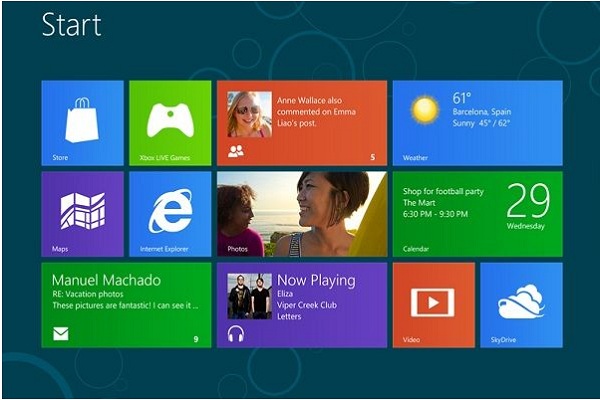Windows RT could be axed, suggests Larson-Green
Microsoft's controversial RT operating system could be headed for the chop.

Windows RT could be heading for the dumper, after a Microsoft senior executive hinted that a rationalisation of its OS line-up is on the cards.
Speaking at the UBS Seminar, Julie Larson-Green, executive vice president of Devices and Studios at Microsoft, explained Windows RT was the software giant's attempt to ape the more simplified users experience offered by the likes of Apple's iPad.
"Windows RT was our first go at creating that more closed, turnkey experience, where it doesn't have all the flexibility of Windows, but it has the power of Office and then all the new style applications," she said.
"The goal was to deliver two kinds of experiences to the market: the full power of your Windows PC [with Windows 8], and the simplicity of a tablet experience that can also be productive [Windows RT]."
However, the differences between the two operating systems may not have been explained very well, she admits, or the differences between the two devices they featured most prominently on. These include the Surface RT and the Surface Pro.
"I think we didn't differentiate the devices well enough. They looked similar. Using them is similar. It just didn't do everything that you expected Windows to do," Larson-Green explained.
"So there's been a lot of talk about [how] it should have been a rebranding. We should not have called it Windows...I think over time you'll see us continue to differentiate more."
Get the ITPro daily newsletter
Sign up today and you will receive a free copy of our Future Focus 2025 report - the leading guidance on AI, cybersecurity and other IT challenges as per 700+ senior executives
That being said, she then goes on to suggest the firm is planning to curtail the number of different versions of Windows it offers in future.
"We have the Windows Phone OS. We have Windows RT and we have full Windows. We're not going to have three. We do think there's a world where there is a more mobile operating system that doesn't have the risks to battery life, or the risks to security," she added.
"But it also comes at the cost of flexibility. So we believe in that vision and that direction and we're continuing down that path."
The future of Windows RT has been at the centre of speculation since Microsoft dropped any mention of the operating system from the name of its second generation tablet, the Surface 2.
-
 Cleo attack victim list grows as Hertz confirms customer data stolen
Cleo attack victim list grows as Hertz confirms customer data stolenNews Hertz has confirmed it suffered a data breach as a result of the Cleo zero-day vulnerability in late 2024, with the car rental giant warning that customer data was stolen.
By Ross Kelly
-
 Lateral moves in tech: Why leaders should support employee mobility
Lateral moves in tech: Why leaders should support employee mobilityIn-depth Encouraging staff to switch roles can have long-term benefits for skills in the tech sector
By Keri Allan
-
 Tiny11 review: Windows 11 with only 2GB of RAM
Tiny11 review: Windows 11 with only 2GB of RAMReview A version of Windows 11 for older machines that don't meet the full requirements
By Nik Rawlinson
-
 Red Hat Enterprise Linux becomes foundational operating system for Cohesity Data Cloud
Red Hat Enterprise Linux becomes foundational operating system for Cohesity Data CloudNews New strategic partnership between Red Hat and Cohesity aims to drive innovation in the data security and management space
By Daniel Todd
-
 Ubuntu shifts to four-week update cycle
Ubuntu shifts to four-week update cycleNews Critical fixes will also come every two weeks, mitigating the issues involved with releasing prompt patches on the old three-week cadence
By Richard Speed
-
 AlmaLinux follows Oracle in ditching RHEL compatibility
AlmaLinux follows Oracle in ditching RHEL compatibilityNews Application binary compatibility is now the aim with 1:1 now dropped
By Richard Speed
-
 How big is the Windows 10 cliff-edge?
How big is the Windows 10 cliff-edge?ITPro Network With some comparing the upcoming Windows 10 end of life to Windows XP, we ask members of the ITPro Network for their insight
By Jane McCallion
-
 Everything you need to know about the latest Windows 11 updates - from bug fixes to brand-new features
Everything you need to know about the latest Windows 11 updates - from bug fixes to brand-new featuresNews Two new cumulative updates are on the way and will be installed automatically on Windows 10 and Windows 11 machines
By Rory Bathgate
-
 How to download a Windows 11 ISO file and perform a clean install
How to download a Windows 11 ISO file and perform a clean installTutorial Use a Windows 11 ISO to install the operating system afresh
By John Loeppky
-
 We could all benefit from better Windows and macOS accessibility features
We could all benefit from better Windows and macOS accessibility featuresOpinion Today’s accessibility features can help you work through a nasty injury, but there’s still plenty of room for improvement
By Barry Collins